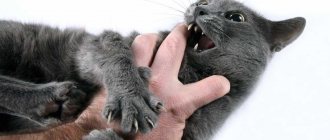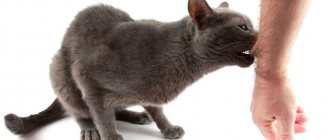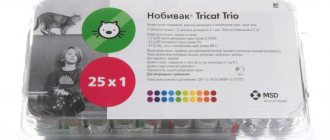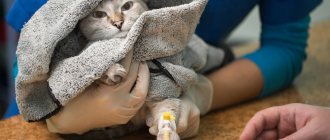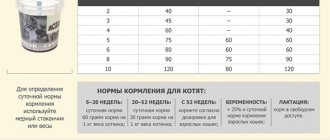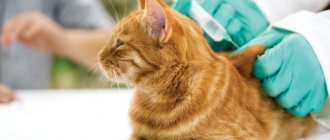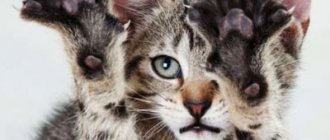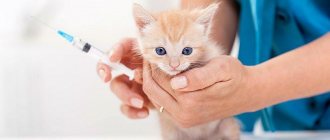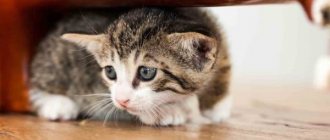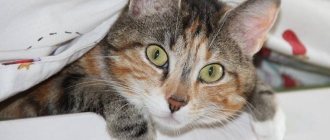Quarantine after vaccination against rabies in cats is a time when the animal needs special care and attention. After vaccination, the animal’s body is vulnerable, because immunity gradually gains strength. If a cat is quarantined according to all the rules after being vaccinated against rabies, then the life and health of the pet will not be in danger.
The possible consequences cannot be underestimated, so post-vaccination quarantine must be taken seriously.
What is quarantine and why is it needed?
Rabies is a dangerous disease that most often ends in the death of domestic animals and poses a mortal threat to humans. The insidiousness of the virus lies in the fact that symptoms appear only in the later stages, when the pet can no longer be saved. Vaccination is the only way to prevent rabies in cats.
Important! The danger of infection exists even when the pet does not go outside, for example, if it eats a sick mouse.
A cat needs a rabies vaccination if:
- the animal takes part in exhibitions;
- the owner plans to transport the cat or kitten to another region or country;
- for the safety of the owner and his family.
Quarantine after vaccination implies isolation of the animal and the absence of any contact with the external environment. During this time, you cannot walk or bathe the cat, and you must not use potent medications. You also need to protect your pet from sudden changes in temperature - avoid overheating and hypothermia.
Modern rabies vaccines are safe for animal health, but the reaction to the drug depends on the individual characteristics of the body. In a healthy cat, immunity is restored 7 days after vaccination. Despite the fact that modern vaccines rarely cause allergic reactions. However, if the condition worsens sharply after vaccination, you should urgently show the cat to a veterinarian.
On average, the duration of quarantine for a cat is 10-14 days. This period is due to the following factors:
- Antibodies do not appear in the body immediately, so to avoid infection, the cat must be temporarily isolated from other animals.
- After vaccination, the cat’s immunity weakens, making it more difficult for her to resist various viruses and infections.
- If the animal is already infected, then quarantine is needed to identify the disease and protect other pets and people.
During quarantine after vaccination against rabies, the cat requires special attention from the owner. It is necessary to monitor the body temperature and general condition of the animal. In the first 2 days after vaccination, the cat may be sleepy, lethargic, or, conversely, aggressive. Disturbances in the functioning of the gastrointestinal tract may also appear.
Important! The condition returns to normal within a week after vaccination. The help of a veterinarian is not required. But if your cat becomes weaker every day and refuses food and water, you should definitely consult a specialist.
Is rabies vaccination dangerous for cats?
Some owners believe that rabies vaccination can be harmful to their cat's health. This is a completely wrong judgment. Modern veterinary medications, which are used for preventive immunizations and revaccinations, are absolutely safe for animals.
As a rule, post-vaccination reactions and complications develop due to the individual sensitivity of the body to vaccine components, if the rules for working with medications are not followed.
For rabies vaccination, special rabies monovalent vaccines or complex vaccinations are used, which provide protection against several infections simultaneously. After immunization, specific immunity is formed within 21-25 days, the duration of which is 12-36 months.
Advice! It is necessary to vaccinate not only cats that walk along the street, but also furry pets that do not leave the house, especially in regions unfavorable for this infection.
Vaccination should be given to cats that participate in breeding, exhibitions, and also when traveling to another country, abroad.
To minimize the risk of developing possible post-vaccination complications, have your veterinarian administer the vaccine. Specialists will select an effective, safe drug and monitor the animal’s condition after the injection.
Only clinically healthy animals are allowed to be vaccinated against rabies. Before vaccination, the veterinarian conducts a comprehensive examination of the animals and measures the temperature. Weakened, exhausted cats and animals that are at the recovery stage are not vaccinated. Pregnant cats are not allowed to undergo vaccinations, since vaccination can cause disruption of embryogenesis and spontaneous miscarriages. Kittens may be born weakened, with congenital anomalies and pathologies.
Important! The first vaccination for kittens is given at the age of three months. Complex vaccines are used. Re-vaccinate after 21-30 days with the same vaccine. In the future, animals are revaccinated once a year or every three years.
Before vaccination, deworm your cat about three weeks using complex systemic anthelmintics. Treat the fur against external parasites with insecticidal and acaricidal agents.
After vaccination, it is worth keeping the vaccinated cat in quarantine for two weeks, limiting communication with other animals. Avoid hypothermia, overheating, protect your pet from stress and other factors that weaken the body. Carefully monitor the behavior and health of your furry pet, since immediately after the injection, side symptoms may appear in the first two to three days.
How long after vaccination does immunity develop?
After vaccination, the cat’s body begins to produce antibodies, which guarantee lasting immunity from rabies for 1–3 years (depending on the vaccine). Veterinarians identify the main factor that affects the rate of formation of immunity from rabies - a balanced diet.
If the cat receives high-quality food with the necessary macro- and microelements before vaccination, then antibodies are formed much faster, and the effect of the vaccine will be longer.
Other reasons
A lump on the back, thigh, or withers of a cat after vaccination is formed due to the following reasons not related to inflammation:
- allergic response or intolerance to some substances in a vaccine or medicine;
- incorrect injection (use of a short or blunt needle, incorrect choice of injection site);
- characteristics of the body (breed, age, anthropometric parameters);
- administration of the vaccine by the owner in the absence of veterinary education.
In these situations, the swelling may gradually increase, causing redness, including the surrounding area.
When is an animal allowed to be transported and travel abroad?
You can transport a cat on a plane or train within Russia on the 31st day after rabies vaccination. To do this, you will have to issue a veterinary passport and obtain a certificate from the clinic.
The standard duration of quarantine for traveling outside Russia is 40 days. This time will be enough for the required concentration of antibodies to form in the cat’s blood. Before leaving, you will have to take a test to confirm the absence of rabies.
Important! It is not recommended to vaccinate against rabies yourself at home. Without the appropriate certificate, the cat will not be able to take part in exhibitions and will lose its breeding value. Only a veterinarian can enter vaccination records into a pet’s veterinary passport.
The role of feline calicivirus infection in the development of lameness syndrome.
So, calicivirus is undoubtedly capable of causing temporary polyarthritis (inflammation affecting more than one joint) in cats, more often in small kittens. This is a fairly common manifestation of calicivirus infection, and sometimes lameness syndrome can be associated with vaccinations (especially live vaccines).
The severity of the syndrome varies widely, from subtle inflammation and slight limping to severe polyarthritis, where cats refuse to move, lose their appetite, and exhibit painful reactions when touched.
Affected cats gradually recover on their own, but if clinical symptoms are severe, anti-inflammatory drugs may be used for treatment. In addition, many other diseases can cause lameness besides calicivirus infection, and if the clinical signs are severe or persist for more than five days, you should definitely consult a veterinarian.
Required documents for exporting an animal
Before you go on a trip with your pet, you need to prepare a package of documents:
- Veterinary passport with vaccination marks.
- Certificate from the state clinic (form No. 1). The document is valid for 5 days after its receipt.
- Along with the certificate, based on the tests, the doctor will issue a printout with information about the number of antibodies in the body. This is proof that the cat was vaccinated 30–40 days before travel.
It is better to check the acceptable timing of vaccination with the embassy of the country where you plan to export the animal. You also need to check in advance the list of vaccines approved in this state. If the vaccine with which the cat was vaccinated is not on the list or the quarantine period is violated, it will not be possible to take the pet abroad.
Prevention
To minimize the risk, you must adhere to certain rules. The vaccination must be done by a specialist in the clinic, so that the cat is under the supervision of a doctor for an hour. It is necessary to check the expiration date of the vaccine. Injections should be given when the animal is healthy and not wormed. Adhere to the vaccination and revaccination dates. After vaccination, do not bathe, do not wash the injection site, and do not overcool. Be sure to comply with quarantine. During teething in kittens and pregnancy in adult cats, it is better to abstain.
The owner should monitor the pet's condition in the first week. The cat stopped eating and drinking, vomited, a wound or other symptoms listed above appeared at the injection site; this must be reported to the veterinarian. Only he will decide whether to take measures for treatment. If a cat vomits, this may be a common individual symptom, or it may indicate the onset of anaphylactic shock.
How long after vaccination is participation in exhibitions and events allowed?
If the exhibition in which the cat will participate is located within the Russian Federation, then the rabies vaccination must be carried out 30 or more days before the trip. When it is necessary to cross the border to participate in an exhibition, the quarantine period should be clarified with the embassy of the host country.
To avoid troubles, prepare for a trip with a cat in advance. For violation of quarantine after rabies vaccination in many European countries and the United States, considerable fines are provided. In addition, your beloved cat may be taken away and sent to an isolation ward.
Types of complications
Complications after vaccinations are rare. There are 2 main types of consequences in cats:
- An abscess is a cavity filled with purulent fluid. The inflammatory process develops due to the penetration of microbes through the wound. The swelling is hot and painful. The pet does not feel well, weakness, lethargy appears, and the temperature may rise. Abscesses can only be opened by a veterinarian. He also prescribes antibacterial agents to treat the autopsy site.
- Sarcoma is a malignant tumor. It is very rare. A characteristic feature is the duration of stay under the skin. The lump is hard to the touch, but does not cause pain when touched.
For timely detection of complications, constant monitoring of your pet after vaccination is necessary. It is recommended to consult a doctor if there are discharges of pus or blood from the lump, prolonged resorption, changes in behavior, baldness of the skin, or the formation of ulcers.
What happens if you don’t comply with the quarantine deadlines?
Violation of quarantine conditions after vaccination can cause a lot of problems: from an increased risk of contracting a dangerous infection to a ban on crossing the border or isolating the animal.
Even if the risk is small, you should not neglect the advice of veterinarians, because the health and life of your little furry friends is of great value. If your cat is vaccinated against rabies on time and after vaccination maintains quarantine according to all the rules, then it will strengthen its immunity and live a long and comfortable life next to its caring owner.
Why is vaccination necessary?
It is important to have regular vaccinations for the following reasons:
If an animal is not vaccinated against rabies, then when it becomes ill, it becomes potentially dangerous to everyone.
- The diseases against which vaccines are created are deadly for animals. If an unvaccinated cat gets sick, then there is a high chance that everything will end in death.
- A sick cat poses a danger to other pets.
- Some diseases, such as rabies, are dangerous to humans. A cat can infect its owner. This disease is fatal to any living creature.
Return to contents
When should you contact a veterinarian?
The formation of swelling at the injection site is considered a normal reaction to vaccination if it does not bother your pet and resolves on its own a couple of weeks after vaccination. In other cases, the help of a specialist is required.
In particular, the following may signal the need to contact the clinic:
- An increase in size of the cone and a change in its color;
- A sustained increase in the cat’s body temperature above 39.5-40 degrees for 3-4 days;
- Painfulness of education;
- Swelling persists for more than a month.
Important! If your cat’s temperature persists for 3-5 days and then returns to normal, you should not assume that the problem is solved. After all, this is precisely the course that characterizes an abscess: during the period of its formation, the temperature rises and pain is noted, but as soon as it has matured, all symptoms disappear, and the pus seeks a way out. Therefore, it is imperative to contact a veterinarian.
Swelling after vaccination and oncology
Cats are also characterized by a pathology such as post-injection fibrosarcoma. This is a malignant tumor that forms at the injection site. It occurs infrequently - in 3-5% of cases, but requires immediate intervention.
Fibrosarcoma has characteristic features:
- This is a dense, painless and mobile formation;
- It originates and grows slowly - after 2-3 months it barely exceeds the size of a pea;
- At the site of its formation, the hair often falls out, and if the process is neglected, after more than six months, ulcers appear.
If you suspect a tumor, you should contact your veterinarian to remove the lump and have it examined histologically.
A mistake that costs your life
A bump on the withers after vaccination - possibly post-injection sarcoma (a rare complication; cats have infectious oncology)
At the same time, we were looking for the old owners in the village, suddenly she got lost and accidentally came to us, but the search was in vain. Finally, the time has come for vaccination (before this, treatment against parasites was carried out according to the rules). It was a day off, we went to the clinic where I see all the other cats, but there was no free appointment there, and I decided to go to another clinic - after all, it was just a vaccination. The doctor examined the cat, obtained passports and vaccinated (Nobivac Trio and Rabizin).
When we left, I had
a sticky feeling , as if I had done something irreparable, but I attributed everything to the fact that I simply used the services of another clinic and it was unusual for me.
On Wednesday night, when I came home from work, I found the animal in poor condition, and we went to a 24-hour veterinary clinic in a neighboring city.
- enlarged lymph nodes,
- temperature 41,
- unbearable odor from the mouth,
- blackened teeth,
- anemia (pale mucous membranes),
- a small amount of free fluid in the liver area (ultrasound).
Why did my cat die after vaccination?
Friends, this is a very difficult story for me. I practically killed a cat with my own hands. Let me make a reservation right away: I AM STRICTLY FOR VACCINATIONS
. Vaccination of animals is a strictly mandatory measure even for those living in an apartment. For example, “distemper” (panleukopenia) is so tenacious that you can bring it home on your shoes; this virus can withstand extreme temperature changes and can survive for about +/- 20 days without a host. The lethality of the virus is 65-90%, the contagiousness is very high.
I was visiting my parents when my husband wrote to me and said that a cat had come to our house and was not going to leave. she climbs to hug, jumps into her arms, tries to climb into a large bag of food that stands in the corridor.
In general, the cat chose us
, and there was no question of kicking her out. We named her Alice because she was red with a big fox tail. She immediately made friends with our other cats and our old dog, who had not walked for a year (he died a few days after her).
To be honest, from the very beginning I felt that something was wrong with her - her eyes were running, her fur was unpleasant and unhealthy to the touch, but the veterinarians convinced me that discharge from the eyes was a variant of the norm in ginger cats, well and the appearance of the fur is simply the result of a not very good life, and soon everything will change - after all, we monitor its nutrition and give it vitamins. I went to the inspection several times, and no one raised the alarm. In addition, we thought that she was pregnant (the cat had a large belly and enlarged mammary glands), but the ultrasound did not show kittens. The doctor who removed the uterus said that she had fibromatosis (false pregnancy) and that the cat was probably fed a sex barrier, but it later turned out that this was not the case.
conclusions
What conclusions can I draw from this whole story? Vaccines aren't that safe
.
Especially for animals with weakened immune systems
.
Animals that you don’t know and haven’t seen, that you just picked up from the street. Giving her a vaccination a month after she moved in with us, given her appearance, was a huge mistake. The worst thing I experienced
was when the cat was already unconscious, and I asked her for forgiveness, but my
forgiveness
was of no use - NOTHING COULD BE FIXED. Now I understand people who try to avoid vaccinations, but at the same time I realize that my cat is one in a million, and getting vaccinated is choosing the lesser of two evils.
Versions of what happened
My husband and I fought for a week, spent about 30 thousand, but still did not find out what happened and how correctly the treatment was prescribed, why we took a second test for immunodeficiency. The cat was in close contact with other animals. They are vaccinated, but some have chronic diseases. I was very afraid of a repeat of the situation, so I consulted with different veterinarians afterwards. We also treated everything we could with bleach, and burned the bed, carrier and other things. I refused the autopsy because I realized that the conclusion would say: infection of unknown origin
;
and that won't clear anything up. The cat had all the symptoms of all diseases at once, but not a single set was completely suitable. The clinic followed the instructions - using the method of exclusion, they checked for the most common and dangerous infections and viruses
; We didn’t have a cat diagnostician like House MD at our disposal.
Outside veterinarians suggested viral anemia, pankeikopenia, post-injection feline sarcoma, acute renal failure due to vaccination, as well as an allergy to the drug Nobivac Trio; in total more than 4 versions.
But I also have my own version of what happened
. After Alice's death, people who knew her wrote to me. They said that for some reason the cat abandoned 2-month-old kittens, which she gave birth to on a plot a few houses away from us (she herself came there from nowhere), and after 1.5 months of wandering, she settled in our house.
Cats don't just abandon kittens. He felt that he was sick.
I am not a doctor, I do not have a veterinary education
, but attentive owners, as well as
mothers
who observe their children,
see the dynamics of the disease
, can give a lot of valuable information.
Before that, I often took responsibility when, for example, I refused treatment for hepatitis because I was sure that the cat did not have hepatitis, and it turned out to be right; Unfortunately, I have little trust in doctors, although I respect them very much. According to our observations, Alice showed symptoms of all the diseases
for which she was vaccinated, namely panleukopenia, viral rhinotracheitis and calcivirosis.
Manufacturers and brands of vaccinations
No vaccine manufacturer guarantees the absence of complications. There are vaccines for which complaints are received more often (Nobivac) and less frequently (PureVax). Other common brands that we do not mention in the article are recommended to a lesser extent. Let's look at the medications that veterinarians usually offer.
Nobivac
Nobivac vaccines (Nobivac, Holland) come in several varieties: Nobivac Tricat against viral rhinotracheitis, calicivirus and panleukopenia, Nobivac Rabies against rabies, etc. There are many complaints about these vaccines. There are serious consequences. Recently there was information in the English-language news that entire batches of the drug led to deaths. However, so far nothing has been proven on this score and the Nobivac vaccine is used by most veterinarians - as a rule, without consequences. In many localities, it remains one of the few ways to protect the animal.
Felocell
The Felocell vaccine (Felocell, USA) is intended for immunization of cats against viral rhinotracheitis, calicivirus infection, panleukopenia and chlamydia. The disadvantage of the quadrivalent vaccine is that it contains a component of chlamydia (it was written above that it is this that causes the main complications). It is better to stick with the trivalent vaccine.
This brand also has a rabies vaccine. As for complications after Felocell, they also occur, but not so often.
Purevax
PureVax (France) is a much less common vaccine. However, veterinarians praise the drug: complications from it rarely occur.
"Purevax" provides immunity from panleukopenia, calicivirus, rhinotracheitis and rabies. It is especially worth paying attention to rabies vaccines, which will be discussed below. In general, Purevax preparations are considered much more environmentally friendly than analogues from other companies.
Disadvantages: higher price and unavailability in many localities. At the same time, ordering the drug via the Internet is dangerous, because... there is no guarantee that it will arrive, as expected, refrigerated.
Felinologists warn that allergies and autoimmune reactions are often observed with the Biofel vaccine; the Multifel vaccine is well tolerated, but its ability to develop immunity is questionable. There are also complaints of numerous allergic reactions to the Felovax vaccine.
What should you not do?
A lump after vaccination in a cat is not always absolutely safe. Like any inflammatory process, it can be complicated by infection and develop into an abscess or phlegmon. To avoid such consequences, you should not:
- Rub and massage the swelling, trying to “disperse the vaccine”;
- Apply alcohol compresses;
- Apply cold and warm compresses.
Any “hot” methods of exposure can lead to activation of inflammation, and cold ones can slow down the resorption of the vaccine.
